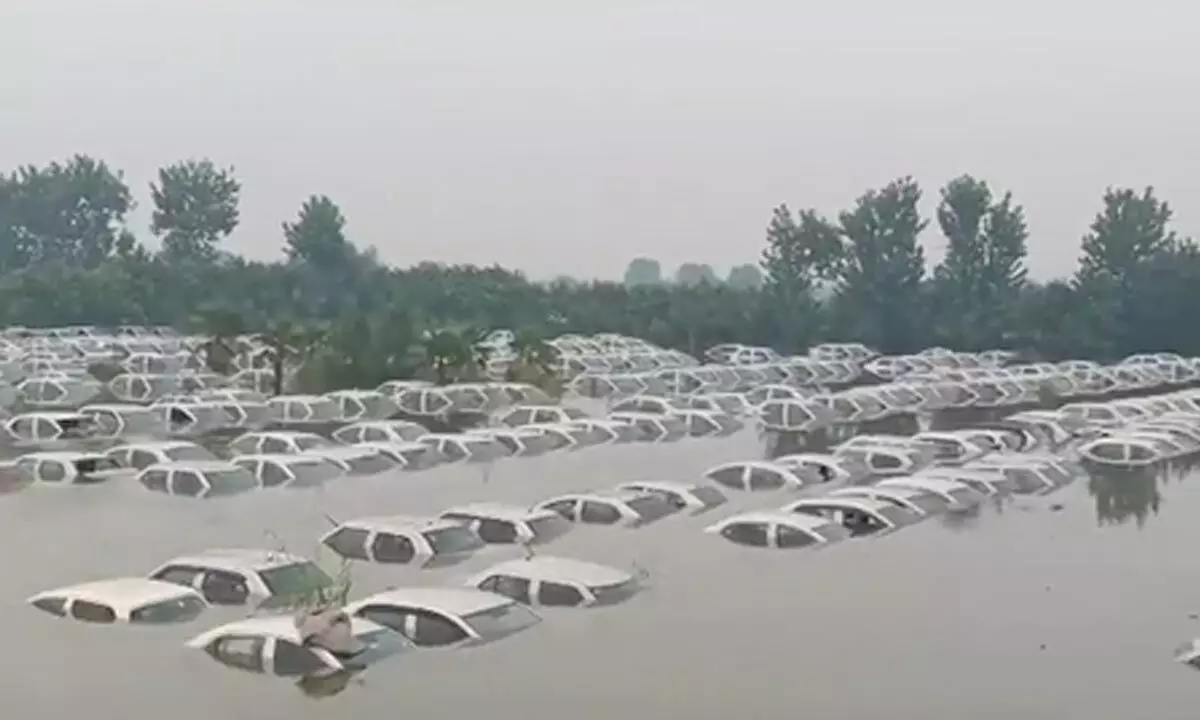Don't's and Do's for flood affected vehicles to get insurance claim

Don't try to start your vehicle if it was submerged in water. Or else you will not get any claim -- insurance or warranty, is the advice that is largely now being heard.
Chennai: Don't try to start your vehicle if it was submerged in water. Or else you will not get any claim -- insurance or warranty, is the advice that is largely now being heard.
Vehicles getting submerged due to heavy rain or being washed away by flood waters seems to be becoming a regular feature in India.
During the 2015 Chennai floods several cars and two-wheelers got submerged. Those who had a comprehensive insurance policy and didn't start their vehicles before the engine was set right were able to get an insurance claim.
Roopam Asthana, Whole Time Director and CEO, Liberty General Insurance talks to IANS on how to cover the vehicles against flood risk, the Do's and Dont's and the modalities for preferring an insurance claim. (Excerpts)
What are the do's and don'ts during floods for motor insurance coverage.
Do's:
- Notify your insurance company as soon as possible.
- Document the damage with photographs or videos.
- Keep all repair bills and receipts.
Don'ts:
- Don't start the engine if the vehicle has been submerged, as it could cause further damage;
- Avoid driving through water-logged areas;
- Don't undertake repairs without informing the insurer and certainly not before the insurance company's surveyor inspects it.
What vehicle cover should owners consider for 2, 3, and 4-wheelers?
Motor vehicle owners should consider comprehensive or package insurance policies for their 2, 3, or 4-wheelers. These plans not only cover third-party liability but also protect against damages due to natural calamities like floods, earthquakes, or cyclones.
The comprehensive policy covers the insured vehicle for any accidental damages, including those due to floods. In addition, owners can opt for add-ons like Engine Protect or Zero Depreciation cover. The Engine Protect add-on offers coverage for damages to the engine due to water ingression, while Zero Depreciation cover ensures full reimbursement without considering depreciation in the event of a claim.
What is the claims procedure for flood-related damage to vehicles?
The process begins with informing the insurance company as soon as possible. After this, a surveyor will inspect the vehicle and assess the damages. The policyholder will then need to submit a duly filled claim form, along with necessary documents, to the insurance company. After document verification, if the claim is approved, the insurance company will settle the claim with the policyholder or directly with the garage, if the vehicle is repaired in a network garage.
What are the necessary documents required for making an insurance claim:
1. a) In case of vehicle is submerged while stationary b) In case of vehicles being washed away by floodwaters
In both scenarios, policyholders need to submit a duly filled claim form, a copy of the insurance policy, FIR copy in case of vehicle loss, original RC book, driving license, and repair estimate for total loss. If the vehicle is financed, documents like a NOC from the financer might be required.
Does a standard motor policy already cover flood insurance, or do policyholders need to opt for additional coverage?
A standard third-party liability insurance policy does not cover flood damage. However, a comprehensive insurance policy includes coverage for damage caused by natural calamities like floods. Additional covers such as engine protection, zero depreciation cover and return to invoice can be availed for broader protection.
Are there any circumstances under which claims for flood-related damage will not be paid?
If the damage is due to the owner's negligence, like deliberately driving through a water-logged area leading to water ingression in the engine, the claim might be rejected. Also, if the policyholder does not have a comprehensive policy that includes coverage for flood damage, the claim would be denied.
How is 'flood' defined in the context of motor insurance? Does it include rainwater and stagnant water?
In the context of motor insurance, a flood refers to an overflow of a large amount of water beyond its normal confines, especially over normally dry land. Rainwater and stagnant water could potentially be considered a flood if it has caused similar damage as a typical flood would.
If a road gets flooded, does it qualify as a flood event for insurance purposes?
Yes, a road getting flooded qualifies as a flood event for insurance purposes, given that the vehicle has been damaged due to this event.
What is the claims experience within the industry regarding flood-related damages, and what can be expected from insurance companies in such situations?
The claims experience varies based on the severity of the flood event and the region it occurred. However, insurance companies are generally proactive in such situations, expediting claim processes and often setting up special camps for quicker claim settlements. Policyholders can expect timely and fair claim settlement. However, the challenge we have noticed in the past is piling up of vehicles for repair at the garages leading to delays in repair work and thus in claims settlement.
Is there any other important information related to floods and motor insurance that policyholders should be aware of?
Policyholders should remember to not start their vehicle if it is submerged in water as it might cause more damage in case the water gets pulled into the engine. They should inform the insurance company immediately and get the vehicle towed to a safe place.
Overall, having a comprehensive motor insurance policy and understanding the claim process can greatly assist vehicle owners in dealing with the aftermath of flood-related damages.











